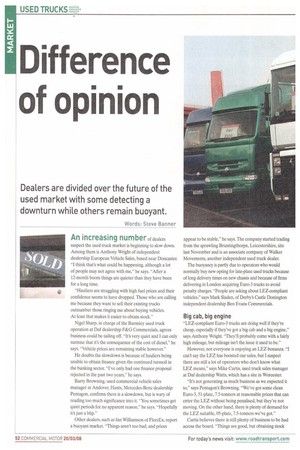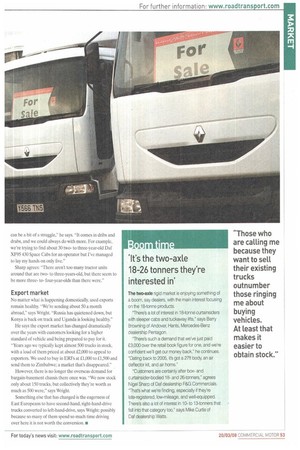Difference of opinion
Page 52

Page 53

If you've noticed an error in this article please click here to report it so we can fix it.
Dealers are divided over the future of the used market with some detecting a downturn while others remain buoyant.
Words: Steve Banner
An increasing numberofdealers
suspect the used truck market is beginning to slow down. Among them is Anthony Wright of independent dealership European Vehicle Sales, based near Doncaster. "I think that's what could be happening, although a lot of people may not agree with me," he says. "After a 12-month boom things are quieter than they have been for a long time.
"Hauliers are struggling with high fuel prices and their confidence seems to have dropped. Those who are calling me because they want to sell their existing trucks outnumber those ringing me about buying vehicles. At least that makes it easier to obtain stock."
Nigel Sharp, in charge of the Barnsley used truck operation at Daf dealership F&G Commercials, agrees business could be tailing off. "It's very quiet and I can only surmise that it's the consequence of the cost of diesel," he says. "Vehicle prices are remaining stable however."
He doubts the slowdown is because of hauliers being unable to obtain finance given the continued turmoil in the banking sector. "I've only had one finance proposal rejected in the past two years," he says.
Barry Browning, used commercial vehicle sales manager at Andover, Hants, Mercedes-Benz dealership Pentagon, confirms there is a slowdown, but is wary of reading too much significance into it. "You sometimes get quiet periods for no apparent reason," he says. "Hopefully it's just a blip."
Other dealers, such as Ian Williamson of FleetEx. report a buoyant market. "Things aren't too bad, and prices appear to be stable," he says. The company started trading from the sprawling 13runtingthorpe, Leicestershire, site last November and is an associate company of Walker Movements, another independent used truck dealer.
The buoyancy is partly due to operators who would normally buy new opting for late-plate used trucks because of long delivery times on new chassis and because of firms delivering in London acquiring Euro-3 trucks to avoid penalty charges. "People are asking about LEZ-compliant vehicles," says Mark Sladen, of Derby Castle Donington independent dealership Ben Evans Commercials.
Big cab, big engine
"LEZ-compliant Euro-3 trucks are doing well if they're cheap, especially if they've got a big cab and a big engine," says Anthony Wright. "They'll probably come with a fairly high mileage, but mileage isn't the issue it used to be."
However, not everyone is enjoying an LEZ bonanza. "I can't say the LEZ has boosted our sales, but I suspect there are still a lot of operators who don't know what LEZ means," says Mike Curtis, used truck sales manager at Daf dealership Watts, which has a site in Worcester.
"It's not generating as much business as we expected it to," says Pentagon's Browning. "We've got some clean Euro-3, 51-plate, 7.5-tonners at reasonable prices that can enter the LEZ without being penalised, but they're not moving. On the other hand, there is plenty of demand for the LEZ suitable, 05-plate, 7.5-tonners we've got."
Curtis believes there is still plenty of business to be had across the board. "Things are good, but obtaining stock can be a bit of a struggle," he says. "It comes in dribs and drabs, and we could always do with more. For example, we're trying to find about 30 twoto three-year-old Daf X.F95 430 Space Cabs for an operator but I've managed to lay my hands on only five."
Sharp agrees: "There aren't too many tractor units around that are twoto three-years-old, but there seem to be more threetofour-year-olds than there were."
Export market
No matter what is happening domestically, used exports remain healthy. "We're sending about 50 a month abroad," says Wright. "Russia has quietened down, but Kenya is back on track and Uganda is looking healthy."
He says the export market has changed dramatically over the years with customers looking for a higher standard of vehicle and being prepared to pay for it. "Years ago we typically kept almost 500 trucks in stock, with a load of them priced at about £2,000 to appeal to exporters. We used to buy in ERFs at £1,000 to £1,500 and send them to Zimbabwe; a market that's disappeared."
However, there is no longer the overseas demand for bargain-basement chassis there once was. "We now stock only about 150 trucks, but collectively they're worth as much as 500 were," says Wright.
Something else that has changed is the eagerness of East Europeans to have second-hand, right-hand-drive trucks converted to left-hand-drive, says Wright; possibly because so many of them spend so much time driving over here it is not worth the conversion. •








































































































































































